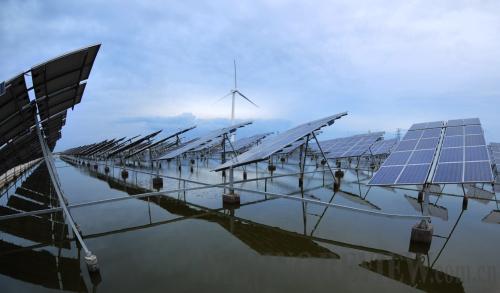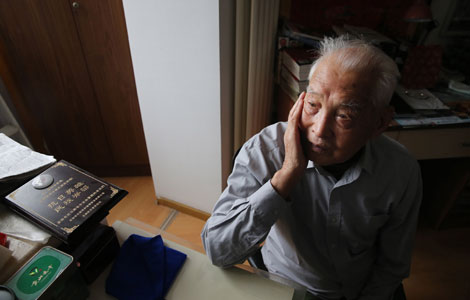For more blue skies
Updated: 2013-09-29 16:36
(bjreview.com.cn)
|
|||||||||||
|
 |
|
CLEAN ENERGY, CLEAR SKY: Dongtai in coastal Jiangsu province uses its rich wind and solar power to supply electricity to local aquiculture industry [Photo/bireview.com.cn] |
Starting from Sept 25, the energy surcharge will be raised from 0.008 yuan per kilowatt-hour (kWh) to 0.015 yuan per kwh for businesses, said the National Development and Reform Commission (NDRC), the country's top economic planner. The surcharge is to make up for a shortfall in China's renewable energy development fund.
To encourage power plants to install equipment to remove nitrogen oxide, a major air pollutant, the government also increased the subsidy for power plants with denitration facilities from 0.008 yuan per kWh of electricity they produce to 0.01 yuan per kWh. Plants produced power under a certain particle-emission standard will also receive a subsidy of 0.002 yuan per kWh of electricity. This policy does not affect residents' electricity bills and is aimed at heavy-polluting industries.
Meng Xian'gan, Secretary General of the Chinese Renewable Energy Society, says this policy illustrates the resolve of the Chinese Government in developing renewable energy, increase energy efficiency among power plants and pushing along the development of China's energy-saving and environmental protection industries.
"This policy will help alleviate the financial difficulties renewable energy industries face and attract more domestic and foreign investment in this emerging sector," Meng said.
Targeting air pollution
Compared with traditional forms of energy, renewable energy has the advantage of being clean, environmentally friendly and, of course, renewable, but the financial costs for its use is currently higher than that for traditional counterparts. For this reason, companies devoted to renewable energy need government subsidies to start. This is also common practice in the international community. According to a report released by the Washington, DC-based Worldwatch Institute, 127 countries have made plans supporting the development of renewable energy.
According to Article 20 of China's Renewable Energy Law, which went into force in 2006, if the price of electricity generated through renewable energy is higher than the cost of electricity generated by using conventional energy, the balance shall be apportioned by adjusting the selling price of the electricity. Based on this, China began to collect renewable energy surcharges as a development fund for renewable energy. The surcharge has been raised several times, and every year 20 billion yuan ($3.27 billion) is collected.
However, because of the rapid development of China's renewable energy industries, the funds cannot satisfy the growing demand for subsidizing renewable energy. By the end of 2011, the subsidy fund had a shortfall of 10.7 billion yuan ($1.75 billion). Therefore the NDRC decided to raise the renewable energy surcharge from present 0.008 yuan per kWh to 0.015 yuan per kWh.
Related Stories
Committed to delivering clean energy to China 2013-09-27 07:03
Clean energy in Mideast attracts Chinese firms 2013-09-19 10:11
China assists Pacific island countries with clean energy projects 2013-09-06 14:44
New cornerstone for clean energy 2013-08-30 10:01
Riding the clean energy boom today 2013-08-05 07:18
Today's Top News
Foreign firms can run entertainment businesses
China won't seek hegemony, FM tells UN
US House moves federal govt closer to shutdown
US spy agency mapped people's behavior -NYT
Special PLA medical squad starts service
Xi to attend APEC summit
East China cities debut 4G phones
12 trapped in N China coal mine accident
Hot Topics
Lunar probe , China growth forecasts, Emission rules get tougher, China seen through 'colored lens', International board,
Editor's Picks

|

|

|

|

|

|





